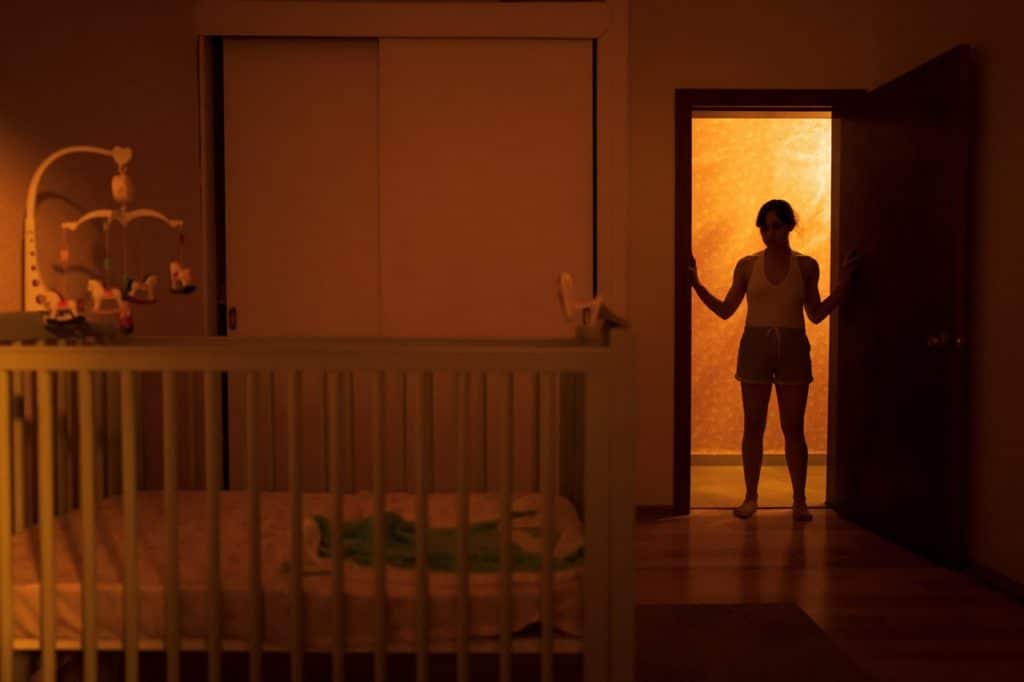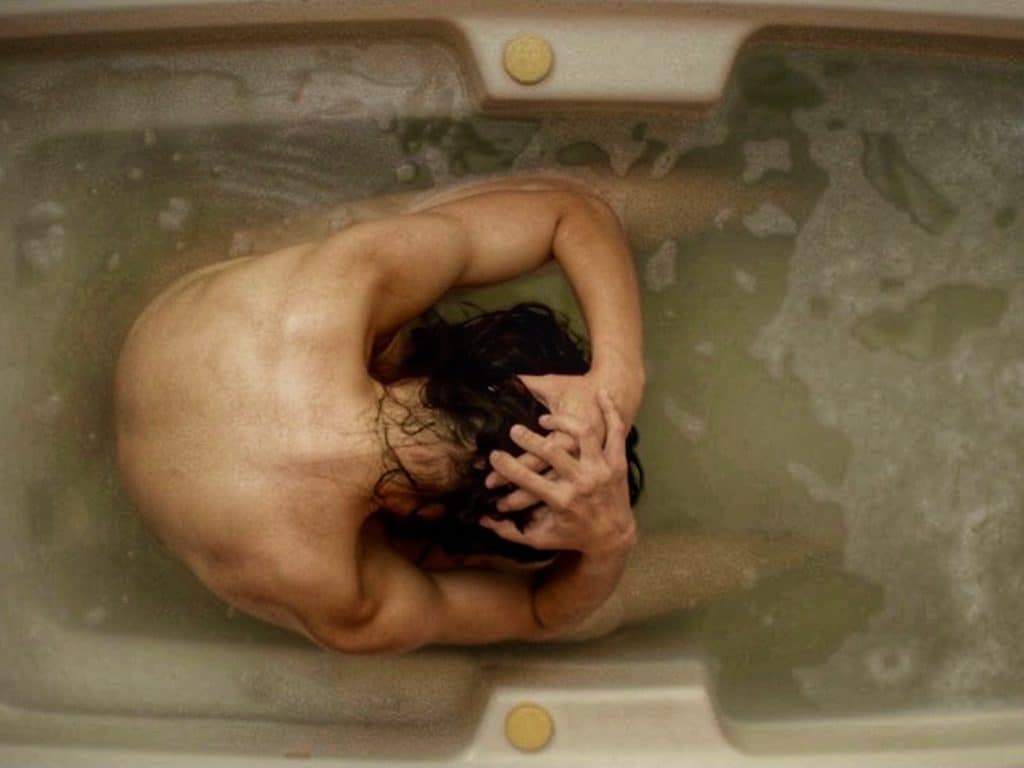Stories about the plight of womanhood and horror go hand-in-hand; several aspects can easily be interpreted for the genre. The whole concept of menstruation is one example. Bleeding for days at a time every month doesn’t sound safe, and yet that is the monotonous existence of women from teenager to later life. The most traumatic and terrifying part of being in possession of a female body though, is pregnancy. Across forty weeks another human grows inside the womb provoking the rest of the body to change. Organs shift around to make space for the lodger, hormone levels spike, and the pressure of keeping everyone healthy can lead to crippling anxiety. Such phenomena have been explored within horror over the years, the most memorable would be Rosemary’s Baby and Inside. As good as they are, Michelle Garza Cervera’s Huesera is about to steal the best pregnancy horror from under them.

Huesera explores the long and complicated journey from woman to mother. The would-be-mother that Huesera casts a spotlight onto is Valeria (Natalia Solián). Valeria and her husband Raul (Alfonso Dosal) are desperate to have a baby. Their efforts are taking longer than they anticipated and Valeria is suffering. Then after a trip with her mother to a statue of the Virgin Mary, something finally clicks and Valeria finds herself pregnant. Elated, Valeria immediately begins nesting, but after the initial honeymoon period wears off, events take an unexpected turn. Haunted and hunted by a strange and sinister woman, Valeria must do all she can to save herself and her unborn child.
Stories about pregnant women under attack are nothing new. Huesera however, approaches pregnancy itself from a different angle. Whilst Valeria has been trying for a baby, and projects outwardly how much she wants a child, inwardly there’s a slight disconnect. It’s not instantly clear, as Valeria is a champion at masking her emotions, but cracks begin to show after a Mother’s Day dinner with her family. Their reaction to Valeria’s pregnancy isn’t the warmest of receptions. Whilst her mother is happy that she is finally fulfilling her womanly ‘duties’, neither she nor Valeria’s sister have any faith in her abilities as a mother. They bring up an old story about a babysitting accident from Valeria’s childhood, using it to legitimise their argument. It’s an awkward scene, which is made worse by Raul laughing at the story. Valeria’s frustration and anger are clear, but the story starts to open up doubts in Valeria herself.
Women are constantly expected to adhere to certain ways of behaviour. This is never more true than when pregnant. Everyone assumes that the expectant mother should be a bundle of giddy excitement. They should always have a smile on their face, wear pretty flowing maternity wear, and immediately relinquish control of their life to the child inside them. Any pregnant woman that veers from this enforced stereotypical behaviour pattern, is judged. Everyone on the street has an opinion on what they should and shouldn’t be doing and will happily share it. This experience is captured beautifully by Cervera. As soon as Valeria displays any ‘abnormal’ behaviour, she is dragged across the coals about it. Not every woman has to act in a certain way, but as Valeria proves, if you step out of the perceived acceptable lines, those around you won’t be happy.
In Huesera it isn’t until the twelfth week that things begin to unravel. Up until this point Valeria has been doing everything that society expects of her. The twelve week mark is when a pregnancy becomes properly official, and as the reality hits home, Valeria starts to behave differently. There’s a big difference in knowing you’re pregnant and understanding that you are, and the switch in gears is captured perfectly in Huesera. Suddenly the full impact and responsibility on Valeria’s shoulders lands and she is immediately suffocated. Slowly, as with many pregnancies, Valeria is stripped of herself. The first thing to go, like for many women, is her job. A carpenter by trade, Valeria has to stop working due to the dangerous nature and environment. This is not just a pause though. Valeria’s workshop is earmarked for the baby’s bedroom. Valeria losing her workspace is an honest reflection of mothers around the world who have to sacrifice jobs they love to raise a child.

That pregnancy is not as Valeria expected, is another common feeling. So much of what goes on behind the curtain of carrying a child is kept secret. These secrets are only discovered once with child, and they can be a lot to accept and understand. Huesera is a horror movie though and so Valeria’s pregnancy is very unlike most. As Valeria’s anxieties build she begins to see a strange, broken-legged woman scuttling around. The strange, slender, almost spider-like woman is straight out of a nightmare and her appearances mess with reality for both Valeria and the viewer. Cervera handles the scare sequences masterfully, pulling off at least three heart-stopping jump scares. What makes these moments even better is that none are signposted in the typical ways and therefore catch the viewer completely off guard.
Disbelieved by most around her, Valeria turns to both her childless aunt and former lover for help. These women, both lesbians, opperate outside of the hetreotive norms and constraints of society and are therefore more receptive to Valeria’s story. Valeria’s aunt also has a keen belief in magic and links Valeria with the local witch doctors. Rather than be the traditional cinematic portrayal, these women operate out of a beauty salon. Their rituals may be old in practice, but they aren’t living in a shack in the wilderness. Huesera pushes even more stereotypes by presenting them in this manner. What makes these sequences so special is that they feel very female and maternal. It’s women helping women, and more importantly, women believing women. Up until these moments Valeria has been belittled, her fears written off as hysterical pregnant lady nonsense. Here though, within these other women, is a safe space for Valeria to speak her truth and be welcomed for it.
A horror film for mothers everywhere, Huesera captures the side of pregnancy that society wants to believe doesn’t exist. Even the most hopeful mother can experience doubts or distress when faced with the cold reality of how much of themselves they have to sacrifice to become a parent. These anxieties are filtered beautifully through the story in Huesera. Cervera’s feature debut also works for those that haven’t experienced being pregnant with some well placed instances of more traditional horror. Huesera bridges the gap between real horror and the fictionalised variety, producing a film able to terrify and traumatise all on some level or another.
Huesera
Kat Hughes
Summary
Though the true horror of Huesera will be felt deepest by those that have lived through pregnancy and motherhood, Huesera has plenty of traditional horror elements to terrify all who watch it.
Huesera was reviewed at Celluloid Screams 2022. Huesera arrives on Shudder on 12th May.
Kat Hughes is a UK born film critic and interviewer who has a passion for horror films. An editor for THN, Kat is also a Rotten Tomatoes Approved Critic. She has bylines with Ghouls Magazine, Arrow Video, Film Stories, Certified Forgotten and FILMHOUNDS and has had essays published in home entertainment releases by Vinegar Syndrome and Second Sight. When not writing about horror, Kat hosts micro podcast Movies with Mummy along with her five-year-old daughter.

Latest Posts
-


Home Entertainment
/ 9 hours ago‘Fyre Rises’ digital review
This British indie packs some punch.
By Ben Read -


Netflix
/ 6 days ago‘Zero Day’ teaser; Robert De Niro leads the Netflix film
Robert De Niro is leading out the upcoming Netflix series Zero Day, a teaser...
By Paul Heath -


Film News
/ 6 days agoChristopher Nolan’s next film is ‘The Odyssey’
After what seems like months of speculation, it has finally been revealed that Christopher...
By Paul Heath -


Film News
/ 6 days agoOne more trailer for Bob Dylan biopic ‘A Complete Unknown’
A final trailer has been released for A Complete Unknown, the Bob Dylan biopic...
By Paul Heath














